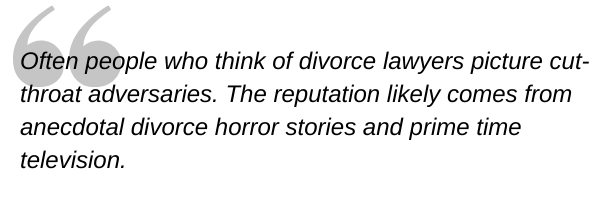It may seem counterintuitive to retain a lawyer for your divorce that your spouse’s lawyer recommends, but in our collaborative law practices, it happens all the time. It’s usually one spouse who initiates contact with legal counsel, and after that first meeting, we typically provide a list of other collaborative lawyers for the second spouse to consider.
Do you think that’s bizarre? Are you wondering how you could ever trust someone that your former spouse’s lawyer suggests? How could they ever truly be in your corner and act in your best interests?

It’s an understandable reaction, and we even expect it. But, take a step back and let’s look at the situation more closely. In collaborative family law, divorce matters are settled around a table between parties rather than by a judge in court. Everyone has to work together, and trust is a crucial element for working things through quickly and amicably.
Often people who think of divorce lawyers picture cut-throat adversaries. The reputation likely comes from anecdotal divorce horror stories and prime time television. That image couldn’t be further from the truth when it comes to those in collaborative practice.
To be clear, as lawyers, we have an ethical obligation to provide our clients with independent legal advice that considers their best interests. Engaging in the collaborative law process doesn’t mean emotions never run high or that there aren’t difficult decisions to navigate to resolve issues. What it does mean is that when we examine the circumstances of the divorcing couple, both lawyers ensure all relevant information is considered by the parties reasonably.
Frankly, a good working relationship between lawyers can make things go much more smoothly. When we have a history of working on files together and a similar style, it can help streamline the process and result in cost savings for our clients.
Also, when there is trust between lawyers (and others on the collaborative team), it can alleviate trust issues the divorcing parties may have. Our clients know we have their backs and are committed to a fair process.
So, if your spouse has presented a list of lawyers to you recommended by their lawyer, examine your options. Visit the website of your spouse’s lawyer to determine if their beliefs and processes align with what you hope to achieve. If so, that should give you the reassurance that by choosing one of the recommendations, you’ll both have counsel that is committed to the collaborative process for a fair resolution to your divorce.
By
Richard Pollock
 If you have questions about this post or collaborative law in general, contact me today at [email protected].
If you have questions about this post or collaborative law in general, contact me today at [email protected].
Kim Soul
 As an associate at Bennet Waugh Corne, I’m happy to discuss the collaborative law process to see if this respectful, family-focused way to resolve the breakdown of a relationship is right for you. You can reach me at [email protected]
As an associate at Bennet Waugh Corne, I’m happy to discuss the collaborative law process to see if this respectful, family-focused way to resolve the breakdown of a relationship is right for you. You can reach me at [email protected]

